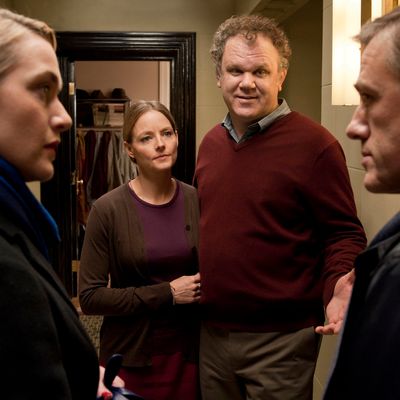
Theatergoers, especially overseas, adore French playwright Yasmina Reza because she makes fun of their haut-bourgeois pretensions while also catering to their sense of superiority. Her four-character comedy God of Carnage, shortened to Carnage for the film directed by Roman Polanski, is a scabrous, amusing, and thoroughly predictable exercise in exposing the animalistic underbellies of grown-ups pretending to be civilized liberals.
Onscreen, Jodie Foster and John C. Reilly play the middle-class couple, Penelope (works in a bookstore) and Michael (owns a plumbing supply company) Longstreet, while Kate Winslet and Christoph Waltz are the yuppies, Nancy (broker) and Alan (Big Pharma lawyer) Cowan. TheyÔÇÖve come together to discuss the CowansÔÇÖ 11-year-old-sonÔÇÖs assault on the LongstreetÔÇÖs son, and you know from the opening notes of self-congratulation (ÔÇ£Fortunately, there is still such a thing as the art of coexistence, isnÔÇÖt there?ÔÇØ ÔÇ£ItÔÇÖs so much better than getting caught up in that adversarial mind-set!ÔÇØ) that the polite veneer is destined to explode. The pleasure, such as it is, comes from anticipating the land mines and then gauging the scale of the devastation.
The action unfolds in the LongstreetsÔÇÖ Brooklyn Heights apartment, from which, Alan notes, glancing out the window at a passing train, ÔÇ£You can see the El!ÔÇØ ÔÇö suggesting no one involved in the film has ever been to Brooklyn Heights. (Polanski can be forgiven for not shooting Carnage in this city, given the certainty heÔÇÖd be arrested as soon as he stepped off the plane for the rape of a minor.) Every time the visit is about to end amicably and the Cowans move to the door or summon the hall elevator, some niggling bit of unresolved business brings them back for coffee or a piece of apple-and-pear cobbler. ItÔÇÖs like No Exit for anxious breeders.
Having had his movements constricted so often (hiding out as a child during the Holocaust, in jail in the seventies, confined to house arrest last year), Polanski knows how to make a pleasant-enough apartment seem like a hell. The characters are either awkwardly squashed together or isolated in the frame ÔÇö thereÔÇÖs never a warm composition. Reza has an Ibsen-like penchant for jokes suggesting the tension between this cozy living space and the mythic savagery beyond the picture windows. Alan is regularly interrupted by his cell phone, on which he counsels his drug-company clients on how to lie about a medicine that has turned out to have catastrophic side effects. Michael must answer to NancyÔÇÖs charge that setting his daughterÔÇÖs hamster free in the middle of Brooklyn (the noise of the wheel annoyed him) was an act of cruelty. Penelope talks of writing about Darfur. ThereÔÇÖs a book of Francis Bacon paintings on the coffee table. ÔÇ£People are monsters,ÔÇØ says Alan, when all the niceties have fallen away.
If the look of Carnage is cinematic, the dialogue sounds stagy and over-rehearsed, the translation spotty. (ÔÇ£Are you planning on sanctioning Zachary in any way?ÔÇØ asks Penelope. In this country weÔÇÖd use the word, ÔÇ£punish,ÔÇØ reserving ÔÇ£sanctionÔÇØ for Axis of Evil countries.) On a happier note, itÔÇÖs barely 75 minutes (plus credits) and the stars look like theyÔÇÖre having a good time. Waltz gets hung up by his American accent and Foster, playing prim, overdoes the tremors in the last fifteen minutes. But Kate WinsletÔÇÖs winces and John C. ReillyÔÇÖs doofus-y early attempts to defuse all conflict are riotous. ItÔÇÖs the characters ÔÇö their lack of stature, even comic stature ÔÇö that finally hang the actors up. RezaÔÇÖs chief interest is in humiliating them, exposing their worldviews as shallow or self-serving or both. There are no saving graces, almost no respite from the general falseness and stupidity. She hates her own creations ÔÇö and so, in the end, do we.


